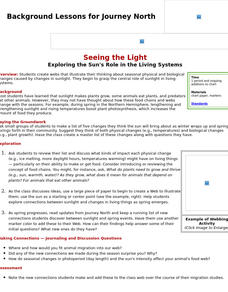Curated OER
Living Systems Part III
Here is a fantastic, informative, interactive presentation on plant and animal cells. The PowerPoint is produced by an elementary school teacher who has a doctorate in science, and it shows! This would be a splendid presentation to use...
Curated OER
Tadpoles
Learners examine tadpoles at various stages of development. Questions in observation category assess students' ability to use a variety of senses to observe data in a certain way-scientific way.
Curated OER
T's Alive! Or Is It?
Learners explore data on the bone, muscle, and skin of living systems and then create a list of characteristics of these systems and relate these characteristics to bone, muscle, and skin.
Curated OER
The Skeletal System
Students identify bones off a skeleton during quizzes; assemble disarticulated skeletons; bird, frog and rat. They dissect frogs, remove the muscle tissue, and identify of bones.
Curated OER
Physical Principles in Living Systems
Seventh graders experiment with white light, plane mirrors, and curved mirrors in order to demonstrate the physical principles of living systems. In this physical principles lesson plan, 7th graders take 3 days to discover what happens...
Curated OER
Can You "Gas" What's Happening?
Students examine gas production in "soil" samples through hands on activities and class discussions, to determine if the soil samples have contain living or non-living systems.
Curated OER
Exploring the Sun's Role in Living Systems
Learners create graphic organizer webs that illustrate their thinking about seasonal physical and biological changes caused by changes in sunlight. They identify the central role of sunlight in living systems.
SMART Technologies
Smart: Living and Nonliving Things
Students define the characteristics of living and non-living things, identify living and non-living components of an ecosystem, and identify the roles of organisms in living systems.









